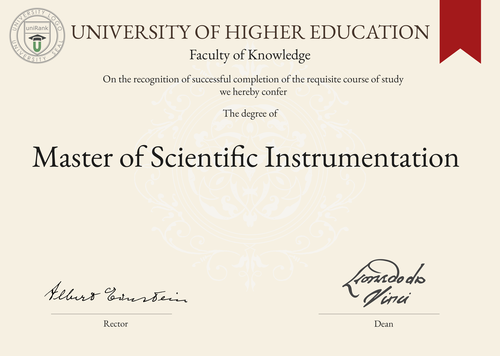
Master of Scientific Instrumentation (MSc in Scientific Instrumentation)
Guide to Master of Scientific Instrumentation Program/Course/Degree
Master of Scientific Instrumentation (MSc in Scientific Instrumentation)

Program Name
Master of Scientific InstrumentationProgram or Degree abbreviation
MSc in Scientific InstrumentationDuration range
The duration of the program typically ranges from 1 to 2 years, depending on the university and country.Tuition range
Tuition fees for the Master of Scientific Instrumentation program vary depending on the chosen country and university. It is recommended to check with specific institutions for accurate information.Overview
The Master of Scientific Instrumentation program is designed to provide students with advanced knowledge and skills in the field of scientific instrumentation. It focuses on the development, design and application of various instruments used in scientific research and analysis.Curriculum Overview by year
The curriculum of the Master of Scientific Instrumentation program is structured to cover both theoretical and practical aspects of scientific instrumentation. The coursework is typically divided into different modules or subjects, which may include: Year 1: - Introduction to Scientific Instrumentation - Principles of Measurement and Instrumentation - Electronics and Signal Processing - Data Acquisition and Analysis - Instrumentation Design and Development Year 2: - Advanced Topics in Scientific Instrumentation - Instrument Calibration and Maintenance - Research Project or ThesisKey Components
The key components of the Master of Scientific Instrumentation program include: 1. Theoretical Knowledge: Students gain a solid understanding of the principles and theories behind scientific instrumentation. 2. Practical Skills: Students acquire hands-on experience in designing, developing and operating various scientific instruments. 3. Research Project: Students have the opportunity to undertake a research project or thesis, allowing them to apply their knowledge and skills to real-world problems. 4. Collaboration: The program encourages collaboration with industry partners and research institutions, providing students with networking opportunities and exposure to cutting-edge technologies.Career Prospects
Graduates of the Master of Scientific Instrumentation program have a wide range of career prospects. They can work in various industries, including research and development, manufacturing, healthcare, environmental monitoring and quality control. Potential job roles include: - Instrumentation Engineer - Research Scientist - Quality Control Specialist - Product Development Manager - Technical ConsultantSalary Expectations
Salary expectations for graduates of the Master of Scientific Instrumentation program can vary depending on factors such as location, industry and level of experience. Generally, professionals in this field can earn competitive salaries, with the potential for growth as they gain more experience and expertise. For a more accurate understanding of salary expectations, you can utilize the Job Sites Search Engine, from our sister site jobRank, which searches over 4,600 job sites worldwide. Make sure to specify not only the job title but also the country you are interested in.Conclusions:
It is important to note that the duration, tuition fees, curriculum, key components, career prospects and salary expectations of the Master of Scientific Instrumentation program can vary depending on the chosen country or location of study, as well as the specific university. Prospective students are advised to research and compare different institutions to find the program that best suits their needs and goals. Visitors interested in pursuing a Master of Scientific Instrumentation degree can use the uniRank World Universities Search Engine to search for universities offering this specific degree anywhere in the world. This search engine provides a comprehensive database of universities and their programs, making it easier to find the desired program in various countries.World Universities Search Engine
search for Master of Scientific Instrumentation (MSc in Scientific Instrumentation) and add the Location (country, state etc.) or specific University you are interested in studying at.
Query examples:
- Master of Scientific Instrumentation (MSc in Scientific Instrumentation) United States
- Master of Scientific Instrumentation (MSc in Scientific Instrumentation) United Kingdom online
- Master of Scientific Instrumentation (MSc in Scientific Instrumentation) Australia international students
- Master of Scientific Instrumentation (MSc in Scientific Instrumentation) University of California
- Master of Scientific Instrumentation (MSc in Scientific Instrumentation) University of London tuition fees
- Master of Scientific Instrumentation (MSc in Scientific Instrumentation) University of Sydney scholarships
Share Program/Course
Interesting? Share this program/course/degree info with your friends now.